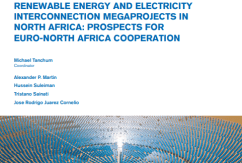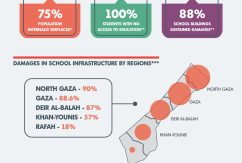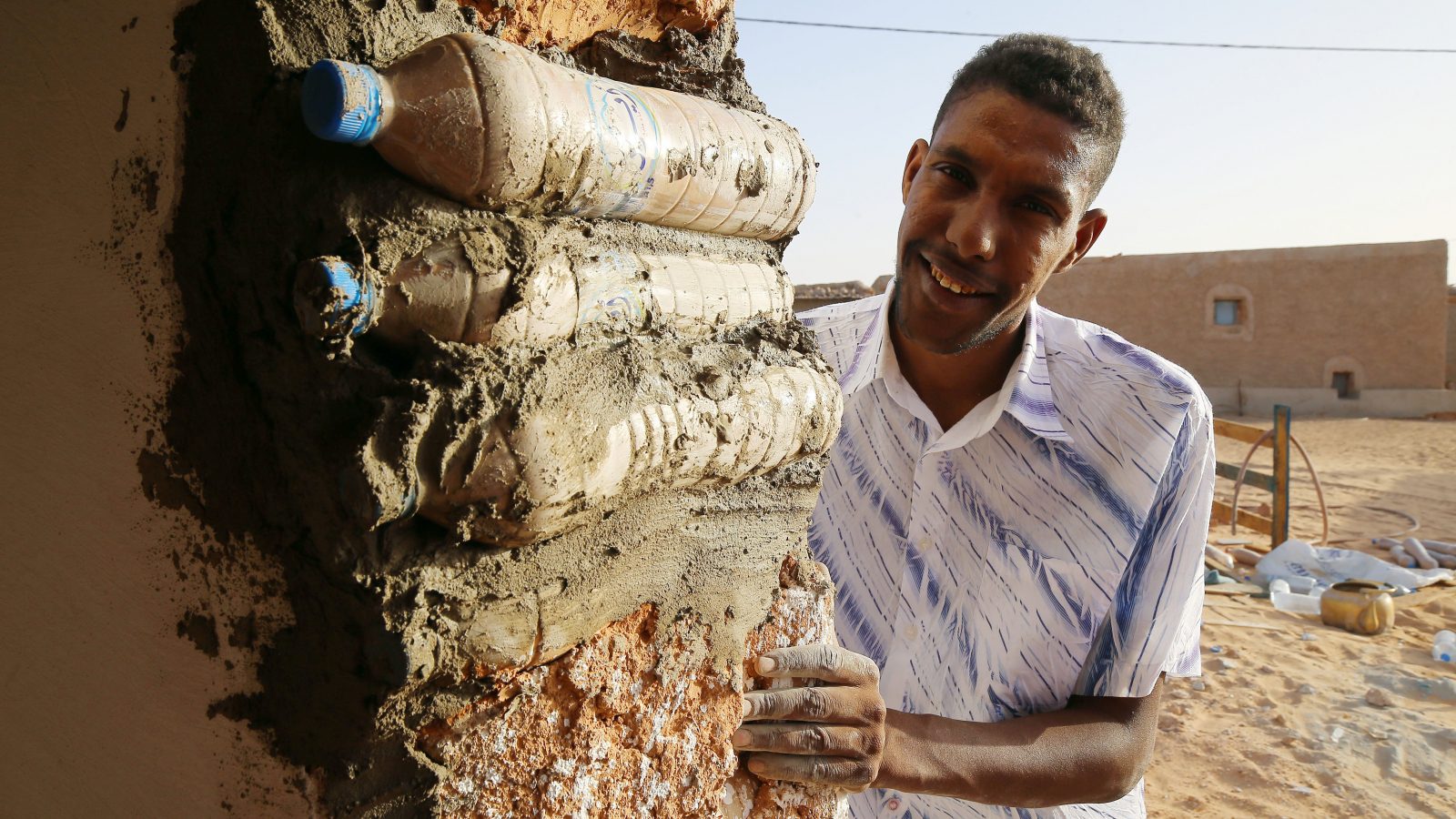Tateh, the Hamada Eco Builder
Tateh Lahbib Braïka received a scholarship from the Erasmus Mundus Higher Education Mobility Programme and studied Energy Efficiency at the University of Las Palmas de Gran Canaria in the Canary Islands. After obtaining a master’s degree, he returned to the Sahrawi refugee camps in south-western Algeria to develop a new concept of building solid and inexpensive eco houses using plastic bottles.
El Batoul Mohamed is proud of her new house. She feels safe there with her 17-year-old son Abdelmadjid, who is blind by birth. El Batoul and Abdelmadjid are Sahrawi. Like tens of thousands of Sahrawis, they live in refugee camps in Tindouf, a region 1900 km south-west of Algiers, close to the borders of Western Sahara and Mauritania. The climate in Tindouf is extremely harsh: temperatures of up to 60° Celsius in summer, freezing nights in winter and destructive sandstorms.
There are only twenty-five of these small, circular 4m² houses in the region. Mouilamine Salha has also been given one of them. Head of a very poor family, she explains that her life has totally changed since she moved there. “We stay here during the hottest hours of the day. The temperature is milder here. In the past, we used to be very scared when the wind picked up. Now we are safe and even receive our neighbours during storms.” In fact, these small houses are quite unique because their walls are made of plastic bottles!
Erasmus brothers
At 28, Tateh Lahbib Braïka is the designer and builder of these houses. He was nicknamed “the bottle freak” by the refugees at the Aousserd camp. “My neighbours were surprised to see me digging through the garbage cans to collect the bottles”, says he ironically. Like the vast majority of Sahrawi children, Tateh’s school career began in the camps and continued in Algeria. “After obtaining my A-levels in 2009, I enrolled at Msila University (an upland town 250 km south-east of Algiers), where I obtained a bachelor’s degree in Renewable Energies. Once I obtained my degree, I sent applications to several European universities in order to further my studies in this field.”
During his search, he learnt about the existence of the European Union Erasmus Mundus programme. “For me it was a golden opportunity because that year Erasmus decided to grant scholarships to refugees residing in North Africa. My brother Bella and I sent our applications to several universities and they were accepted by the Universidad de Las Palmas de Gran Canaria in the Canary Islands. Bella was accepted for a master’s degree in interpreting and I was accepted for a master’s degree in energy efficiency. We were the first Sahrawi refugees to benefit from the Erasmus Mundus programme! “, says Tateh proudly.
Erasmus Mundus gave him the opportunity to do “exciting studies”. “I discovered a new world, new working methods and a new way of thinking to find solutions to problems. What might seem impossible to achieve has become accessible simply by applying certain methodologies. This year of study was also a very rich one in terms of human relations because I met students from different countries and different cultures. It’s a great human adventure”.
Erasmus has also given his brother Bella a solid foundation. He is currently pursuing a Master’s degree in Conflict Resolution at an American university. By the way, Laaroussi, their youngest brother, was also granted a scholarship through this program and has obtained a master’s degree in modern literature at the University of Madrid.
A house for my grandmother
Once back to the Tindouf camps, Tateh finds himself faced with the stark reality of refugees. “We are thousands of young people with diplomas, unemployed under the sun in the Hamada. There are barely any job in the camps. But I refused to resign myself; I was convinced that the knowledge I had acquired could improve the situation of Sahrawi refugees”.
In November 2016, he set himself the challenge of designing a new type of home. “The homes in the camps are precarious. They are basically made of earth bricks. The problem is that these buildings are covered with a metal sheet roof. These metal sheets are torn away by the first storm and are becoming really dangerous for the camp-dwellers. In summer, the metal roof transforms these houses into furnaces. Moreover, the rare rains that fall on the Hamada destroy these houses”.
His first house Tateh built was for his grandmother. She was old and very sick. “She died this summer. But I am proud to have offered her this shelter before she left us”, he says sadly.
How did the idea of plastic bottles come about? “Initially, I wanted to build an earthen structure with a Nubian dome. At the University of Gran Canaria, I had written my master’s thesis on this type of architecture which dates back to ancient times. For this thesis, I obtained the maximum score of 10/10. So I started building a prototype, the one my grandmother was supposed to live in, with mud bricks”.
His first attempt was a failure. He then launched a new concept consisting of a green roof. “I collected a large quantity of plastic bottles which, when cut in half, were to be used as pots for wheat seeds. The aim was to obtain a plant cover on the top of the house to provide a natural protection against heat. I failed a second time; it was not easy to grow wheat at temperatures above 50 degrees Celsius”. Tateh did not give up, though. He ended up with a lot of plastic bottles… and that was where his idea took shape: using bottles as building materials!
“I started by filling bottles with sand that I used to build the wall of the house with cement mortar. Thanks to the circular shape of my prototype, its orientation, the solidity of its cement-slab roof, it meets the specifications that I had assigned myself: it was resistant to wind and torrential rain, offered good protection against heat in summer and the icy cold of Saharan nights; it was easy and inexpensive to build using a material that is harmful to the environment. Filled with sand, bottles are much stronger than different types of bricks and blocks. I was all the more satisfied that my grandmother was happy to finally have her indestructible home”.
Entrepreneur and job creator
For the refugee population, Tateh is no longer the “freak” who collects bottles in garbage cans. His skills are recognised. People come from all the camps to see his house. The press has started showing interest in him. One day a delegation from the High Commission for Refugees came to see the prototype. After having had their architect check the solidity of the building, the HCR members asked him to participate in the Innovation service programme. His project came third, with a budget of 60,000 dollars (51,000 euros ) to finance the construction of 25 houses across the Sahrawi refugee camps.
From an unemployed young graduate, Tateh became an entrepreneur and job creator overnight! “Thanks to this technique, we have shown that Sahrawi refugees are not living on the fringes of the modern world and are also concerned with ecological issues. Despite our very difficult living conditions, we are actively involved in the recycling of plastic wastes”.
The 25 houses were built in the 5 refugee camps in the Tindouf region and distributed to needy families. The allocation operation was managed by the Sahrawi Family and Care Ministry. Mariam Salek Hmada, the walia (governor) of Aousserd camp explains the objective of this approach: “the beneficiaries are poor refugee families and families with a disabled member. It is not easy to be a refugee, but things are even more difficult for those in need or suffering because of a disease. Our social system is based on solidarity, Tateh’s initiative is a concrete action in favour of the poorest members of our community”.
Tateh Lahbib Braïka does not intend to leave it at that. In a few months’ time, he will start a one-year training course in Germany at the Transsolar Academy in order to perfect his skills as an eco-builder. However, Tateh remains lucid about the future of his people. “I am building houses for the refugees, but my people should not stay indefinitely on this desert. The Sahrawis arrived in Tindouf in the mid-1970s, but their objective is to return to their land, Western Sahara. As for me, I am only bringing some comfort and security to my people so that they can continue to resist while waiting for a referendum on self-determination to be held”. “My dearest dream is to be able to build houses in Western Sahara”, he adds optimistically.



































